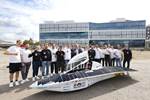Swiss race car breaks EV acceleration world record
Hand-built composite electric race car from ETH Zurich, Lucerne University accelerates from zero to 100 kilometers/hour in less than 1 second.
Students from Switzerland-based ETH Zurich and Lucerne University of Applied Sciences and Arts have broken the previous Guinness World Records for electric vehicle (EV) acceleration with their hand-built electric racing car, mythen. The vehicle, thanks to optimized components, strong traction and mythen’s use of light weight composites, accelerated from zero to 100 kilometers/hour (zero to 62.15 miles/hour) in 0.956 seconds over a distance of 12.3 meters. This beats the previous world record of 1.461 seconds, set in September 2022 by a team from the University of Stuttgart by more than a third.
ETH Zurich students founded the Academic Motorsports Club Zurich (AMZ) in 2006, in which its members have developed a new race car each year entered into the Formula Student in Europe competition. Since 2010, AMZ has been building purely electrically powered race cars. Its team has set the world acceleration record for electric cars twice before — in 2014 and again in 2016.
For the better part of a year, ETH Zurich and Lucerne University of Applied Sciences and Arts students have spent every spare minute working on their EV, overcoming setbacks and going back to the drawing board time and time again for certain components.
“Working on the project in addition to my studies was very intense. But even so, it was a lot of fun working with other students to continually produce new solutions and put into practice what we learned in class,” Yann Bernard, head of motor at AMZ, says. “And, of course, it is an absolutely unique experience to be involved in a world record.”
All of mythen’s components, from the printed circuit boards (PCBs) to the chassis and the battery, were developed by the students themselves and optimized for their function.
Thanks to the use of lightweight carbon fiber and aluminum honeycomb, the race car weighs in at only around 140 kilos (309 pounds). Four-wheel hub motors that the students developed themselves and a special powertrain give the vehicle its impressive power of 240 kilowatts, or around 326 horsepower.
“But power isn’t the only thing that matters when it comes to setting an acceleration record — effectively transferring that power to the ground is also key,” Dario Messerli, head of aerodynamics at AMZ, says. Conventional Formula One cars solve this through aerodynamics: a rear or front wing pushes the car to the ground. However, this effect only comes into play when the car has reached a certain speed. To ensure strong traction right from the start, the AMZ team has developed a kind of vacuum cleaner that holds the vehicle down to the ground by suction.


















